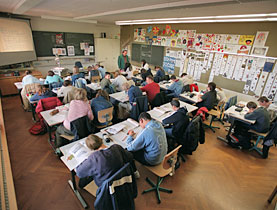Pre-schoolers missing out on education

Switzerland is neglecting the education of pre-school children, according to the Swiss Unesco committee, which has launched the first in-depth study of the issue.
With only 23 per cent of three to four year olds attending some form of pre-school in 2003, Swiss children have a lot of catching up to do with their European counterparts. The European average was 65 per cent.
The aim of the Unesco study is to establish the state of affairs in all Switzerland’s language areas, looking at the scientific, educational and socio-political aspects of the case. There are wide differences in the extent of schooling available to young children in the different regions.
Children in the majority German-speaking cantons tend to start kindergarten part-time at the age of five, while Italian-speaking children in Ticino are in a pre-school programme from the age of three. In most of the French-speaking cantons, children start pre-school at four.
Professor Margrit Stamm from Fribourg University who heads the research project told swissinfo it was important to note how far ahead other European countries were.
“These countries have progressed a lot in recent years while Switzerland remains at quite a low level,” she said.
It is also a question of investment. At 0.2 per cent of GDP Switzerland spends less than half of the level recommended by the OECD on pre-school education and significantly less than its neighbours.
“Neglected”
Pre-school education has been neglected for so long because society did not perceive the need for it, according to Stamm.
“For a long time children under the age of five were expected to stay at home in the care of their parents until kindergarten started. The early education of children was just not an issue in Switzerland,” she explained.
However in recent years several Swiss studies have shown the significant skills difference between children entering the school system, depending on their previous exposure to education.
Pre-school education plays a key role in future success, academic and otherwise, and also helps to overcome initial learning difficulties, according to the Unesco committee.
The committee warns that the race is already lost before children start school. “The unequal starting chances that have been accepted in such a matter-of-fact way are the major injustice of our educational system.”
In the PISA study of education standards at secondary level, Switzerland’s education system emerged as one of the three most socially unjust, after Belgium and Germany. In comparison with most other countries success in Swiss schools depends much more on social background than on intelligence.
Reforms
Switzerland is one of the few developed countries that has no nationwide, coherent model for the training and education of children under six but this situation is being addressed.
In a bid to streamline and improve the fragmented education system a new harmonisation programme has been put together by the directors responsible for education in the cantons. Known as HarmoS, the reform package includes compulsory schooling from the age of four.
HarmoS, which is currently going through the ratification process in the cantonal parliaments, has run into political opposition from the rightwing Swiss People’s Party. Voters in at least one canton will have to vote on HarmoS after the party collected enough signatures to force a referendum.
The People’s Party has multiple objections to the reforms, not least of which is the cost of the new measures. The party is also against increased state interference in schooling and the undermining of parental responsibility.
Despite the campaign against the reforms, the education directors who agreed on HarmoS expect that it will come into force in 2014.
The United Nations Educational, Scientific and Cultural Organization (Unesco) was founded in 1945.
The Swiss Unesco committee of 30 people is chosen by the Swiss government.
The committee represents the values and realises the goals of Unesco in Switzerland.
A central concern of the Unesco “Education for all” programme is comprehensive education for pre-school children, particularly children from disadvantaged backgrounds.
Accepted unanimously by the organisation representing the cantonal directors of education, the new agreement(HarmoS) replaces the one in force since 1970.
The goal of HarmoS is to harmonise the parameters for compulsory schooling in Switzerland.
The starting age for compulsory schooling will be reduced from six to four.
Every school will be obliged to offer extra care options to families outside the traditional school day, such as school meals or supervised homework.
School lessons will be organised according to timetables, at least in the morning.
The teaching of foreign languages will be harmonised and it will not be obligatory to begin with one of the other national languages.

In compliance with the JTI standards
More: SWI swissinfo.ch certified by the Journalism Trust Initiative













You can find an overview of ongoing debates with our journalists here . Please join us!
If you want to start a conversation about a topic raised in this article or want to report factual errors, email us at english@swissinfo.ch.